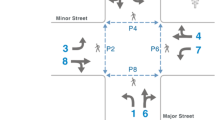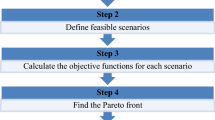Abstract
As local traffic congestion and uncertainty factors existing on roads may lead to cascading failures or even large area traffic network congestion, a pinning control method is proposed to divert the traffic and then restore the smooth flow of traffic. To eliminate the impacts of uncertainties and negative weights for the traffic network performance, the adaptive pinning control and coupling adjustment strategies are designed to estimate controller parameters and adjust coupling strength to compensate for the impacts on the pinned nodes and unpinned nodes. Based on Lyapunov stability theory, adaptive pinning controllers and network adjusters are developed to guarantee the achievement of network synchronization even in the presence of the uncertainties and negative weights. In addition, we investigate the effects of the type of nodes on pinning synchronization performance. Numerical simulations show that if the network’s degree and the single node energy index are considered, better synchronization performance can be obtained by comparing with the pervious pinning schemes.
Similar content being viewed by others
References
Y. L. Wei, J. B. Qiu, and H. R. Karimi, “Fuzzy-affinemodel- based memory filter design of nonlinear systems with time-varying delay,” IEEE Transactions on Fuzzy Systems, vol. PP, no. 99, pp. 1, 2017. [click]
Y. L. Wei, J. B. Qiu, and H. R. Karimi, “Reliable output feedback control of discrete-time fuzzy affine systems with actuator faults,” IEEE Transactions on Circuits and Systems–I: Regular Papers, vol. 64, no. 1, pp. 170–181, Junuary 2017.
X. Z. Jin, Y. G. He, and Y. G. He, “Finite-time robust faulttolerant control against actuator faults and saturations,” IET Control Theory & Applications, vol. 11, no. 4, pp. 550–556, February 2017.
X. Z. Jin, J. H. Qin, Y. Shi, and W. X. Zheng, “Auxiliary fault tolerant control with actuator amplitude saturation and limited rate,” IEEE Transactions on Systems, Man and Cybernetics: Systems, DOI: 10.1109/TSMC.2017.2752961, 2017.
J. Qin, W. Fu, W. X. Zheng, and H. Gao, “On the bipartite consensus for generic linear multiagent systems with input saturation,” IEEE Transactions on Cybernetics, vol. 47, no. 8, pp. 1948–1958, August 2017.
X. Z. Jin, Z. Zhao, and Y. G. He, “Insensitive leaderfollowing consensus for a class of uncertain multi-agent systems against actuator faults,” Neurocomputing, vol. 272, pp. 189–196, Junuary 2018.
X. Z. Jin, S. F. Wang, G. H. Yang, and D. Ye, “Robust adaptive hierarchical insensitive tracking control of a class of leader-follower agents,” Information Sciences, vol. 406-407, pp. 234–247, May 2017.
D. B. Tong, L. P. Zhang, W. N. Zhou, J. Zhou, and Y. H. Xu, “Asymptotical synchronization for delayed stochastic neural networks with uncertainty via adaptive control,” International Journal of Control, Automation and Systems, vol. 14, no. 3, pp. 706–712, June 2016. [click]
M. Q. Liu, H. Y. Chen, S. L. Zhang, and W. H. Sheng, “H ∞ synchronization of two different discrete-time chaotic systems via a unified model,” International Journal of Control, Automation and Systems, vol. 13, no. 1, pp. 1393–1403, February 2015.
T. Chen, X. Liu, and W. Lu, “Pinning complex networks by a single controller,” IEEE Transactions on Circuits and Systems-I: Regular Papers, vol. 54, no. 6, pp. 1317–1326, June 2007.
X. Z. Jin and G. H. Yang, “Adaptive finite-time synchronization of a class of pinned and adjustable complex networks,” Nonlinear Dynamics, vol. 85, no. 3, pp. 1393–1403, August 2016.
J. Qin, Q. Ma, H. Gao, Y. Shi, and Y. Kang, “On group synchronization for interacting clusters of heterogeneous systems,” IEEE Transactions on Cybernetics, vol. 47, no. 12, pp. 4122–4133, December 2017.
L. Dong, J. H. Wang, S. S. Gu, Y. B. Shi, and F. M. Zhao, “Adaptive synchronization of leader-follower networked systems against communication attenuation and actuators faults,” International Journal of Control, Automation, and Systems, vol. 14, no. 6, pp. 1484–1492, December 2016. [click]
Z. K. Li, W. Ren, X. D. Liu, and M. Y. Fu, “Consensus of multi-agent systems with general linear and lipschitz nonlinear dynamics using distributed adaptive protocols,” IEEE Transactions on Automatic Control, vol. 58, no. 7, pp. 1786–1791, May 2011. [click]
X. Z. Jin, G. H. Yang, and W. W. Che, “Adaptive pinning control of deteriorated nonlinear coupling networks with circuit realization,” IEEE Transactions on Neural Networks and Learning Systems, vol. 23, no. 9, pp. 1345–1355, September 2012. [click]
X. W. Liu and T. P. Chen, “Synchronization of nonlinear coupled networks via aperiodically intermittent pinning control,” IEEE Transactions on Neural Networks & Learning Systems, vol. 26, no. 1, pp. 113–126, January 2015. [click]
X. W. Liu and T. P. Chen, “Synchronization of complex networks via aperiodically intermittent pinning control,” IEEE Transactions on Automatic Control, vol. 60, no. 12, pp. 3316–3321, December 2015. [click]
W. Guo, F. Austin, S. Chen, and W. Sun, “Pinning synchronization of the complex networks with non-delayed and delayed coupling,” Physics Letters A, vol. 373, no. 17, pp. 1565–1572, April 2009.
L. O. Chua, M. Itoh, L. Kocarev, and K. Eckert, “Chaos synchronization in Chua’s circuit,” Journal of Circuits, Systems and Computers, vol. 3, no. 1, pp. 93–108, 1993.
I. Leyva, I. Sendina-Nadal, J. A. Alemendral, and M. A. F. Sanjuan, “Sparse repulsive coupling enhances synchronization in complex networks,” Physical Review E, vol. 74, no. 5, p. 056112, November 2006. [click]
X. L. An, L. Zhang, and J. G. Zhang, “Research on urban public traffic network with multi-weights based on single bus transfer junction,” Physica A: Statistical Mechanics and its Applications, vol. 436, pp. 748–755, October 2015.
L. Zhao, M. Deng, J. Q. Wang, and D. L. Peng, “Structural property analysis of urban street networks based on complex network theory,” Geography and Geo-Information Science, vol. 26, no. 5, pp. 11–15, May 2010.
P. Y. Ye, “Complex network characteristics of urban road network topology,” Journal of Transportation Engineering & Information (in chinese), vol. 1, pp. 12–19, Junuary 2012.
Y. Zhao, W. Du, and S. Chen, “Application of complex network theory to urban transportation network analysis,” Urban Transport of China (in chinese), vol. 7, no. 1, pp. 65–70, Junuary 2009.
Y. L. Wei, J. B. Qiu, H. K. Lam, and L. G. Wu, “Approaches to T-S fuzzy-affine-model-based reliable output feedback control for nonlinear ito stochastic systems,” IEEE Transactions on Fuzzy Systems, vol. 99, pp. 1-1, Junuary 2016.
Q. Jiang, J. Xiao, G. Zheng, Y. Zhang, and M. L. Wang, “A pinning scheme in complex networks based on energy index,” Control and Decision (in chinese), vol. 27, no. 1, pp. 22–27, Junuary 2012.
M. J. Lighthill and G. B. Whitham, “On kinematic waves: I. flow movement in long rivers. II. a theory of traffic flow on long crowded roads,” Pharmacology & Therapeutics, vol. 53, no. 3, pp. 275–354, Junuary 1955.
R. Olfati-Saber, J. A. Fax, and R. M. Murray, “Consensus and cooperation in networked multi-agent systems,” Proceedings of the IEEE, vol. 95, no. 1, pp. 215–233, Junuary 2007. [click]
L. F. Wang, H. Chen, and Y. Li, “Transition characteristic analysis of traffic evolution process for urban traffic network,” The Scientific World Journal, vol. 2014, 603274, 2014. [click]
Author information
Authors and Affiliations
Corresponding authors
Additional information
Recommended by Associate Editor Sing Kiong Nguang under the direction of Editor Hamid Reza Karimi. This work is partially supported by the Young Scientists Fund of the National Natural Science Foundation of China (No. 61203152), the National Natural Science Foundation of China (No. 61473195, No. 51574157), the Program for Liaoning Excellent Talents in University (LNET) (No. LJQ2013122) and the Natural Science Foundation of Liaoning Province (No. 2015020037).
DanWang received her B.S. degree in Automatic from Shenyang University, China, in 2002, her M.S. and Ph.D. degrees in Control Theory and Control Engineering from Northeastern University, China, in 2006 and 2009, respectively. Her research interests include complex networks and nonlinear controls.
Wei-wei Che received her B.S. degree in mathematics and applied mathematics in 2002 from Jinzhou Normal University, China; an M.S. degree in applied mathematics in 2005 from Bohai University, China; a Ph.D. degree in control engineering from Northeastern University, China, in 2008. Her research interest includes non-fragile control as well as quantization control and their applications to networked control system design.
Hao Yu received his B.S. degree in Industrial Economy from Harbin University of Science and Technology, Harbin, China, in 2001, his M.S. and Ph.D. degrees in Control Theory and Control Engineering from Northeastern University, China, in 2006 and 2013, respectively. His research include dynamics of network system, network control systems and supply network system.
Jia-Yang Li received the B.S. degree in Computer Technology from Huaqiao University, China, in 2002, and her M.S. degree in Business Management from Huaqiao University, Shenyang, China, in 2006. Her research interests include intelligent transportation and emergency evacuation management.
Rights and permissions
About this article
Cite this article
Wang, D., Che, WW., Yu, H. et al. Adaptive Pinning Synchronization of Complex Networks with Negative Weights and Its Application in Traffic Road Network. Int. J. Control Autom. Syst. 16, 782–790 (2018). https://doi.org/10.1007/s12555-017-0161-8
Received:
Revised:
Accepted:
Published:
Issue Date:
DOI: https://doi.org/10.1007/s12555-017-0161-8




